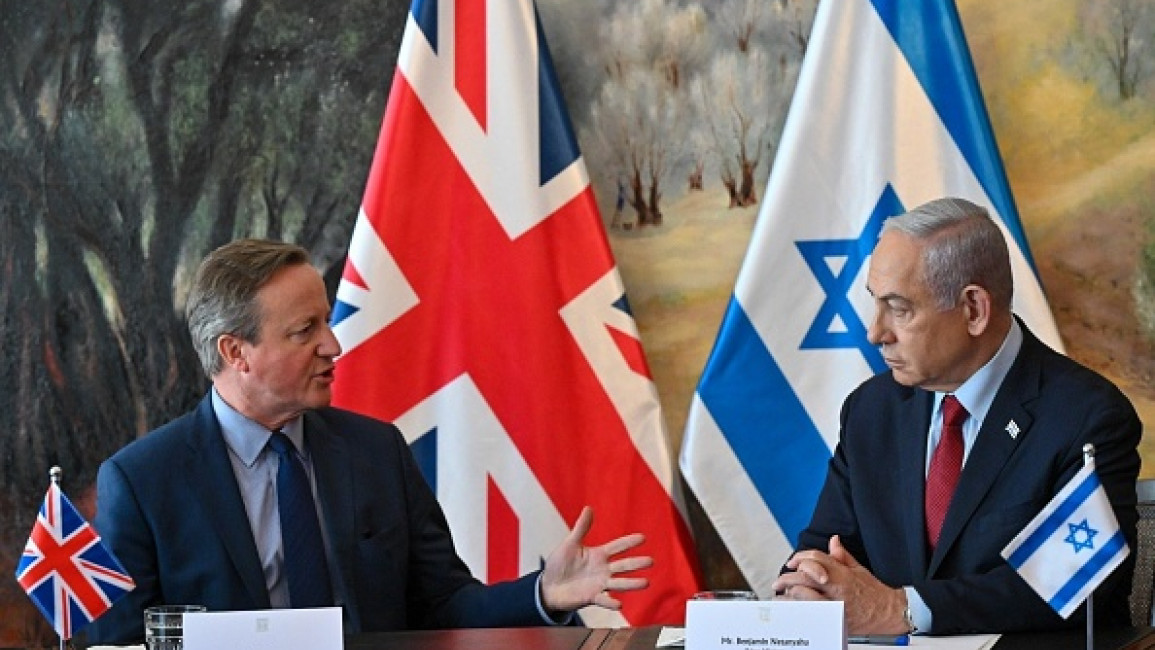
Will Britain finally recognise Palestine as a state?

In recent statements following his fourth visit to the Middle East as British Foreign Secretary, David Cameron indicated that the UK would consider recognising Palestine as a state.
Cameron even suggested that UK recognition of an independent state of Palestine could come before any agreement with Israel, including in the United Nations, adding it “can’t come at the start of the process, but it doesn’t have to be the very end of the process”.
That suggestion predictably sparked anger within Israel, with one member of Israel’s governing Likud Party likening Cameron to a Nazi appeaser.
Yet his comments of an “irreversible shift” in supporting Palestinian sovereignty have sparked optimism for a more proactive British stance on Palestinian rights, potentially improving London's lacklustre engagement with Israel’s occupation of the Palestinian territories.
"Cameron's comments of an 'irreversible shift' in supporting Palestinian sovereignty have sparked optimism for a more proactive British stance"
Husam Zomlot, Palestinian ambassador to the UK, described Cameron’s suggestion as “historic,” adding that “a UK recognition is both a Palestinian right and a British moral, political, legal, and historical responsibility”.
“If implemented,” the ambassador wrote, “the Cameron Declaration would remove Israel’s veto power over Palestinian statehood, would boost efforts toward a two-state outcome [per the pre-1967 borders, with East Jerusalem as its capital].”
Cameron’s statement aligns with the US State Department's own suggestions that it would recognise Palestine, in line with the Biden administration’s stated support for a two-state solution, albeit without a roadmap on how it will support Palestinian statehood.
While a high-ranking official, the UK government may not fully adopt as policy Cameron’s hopeful remarks, as Prime Minister Rishi Sunak did not clear the Foreign Secretary’s statements. And while some MPs within the Conservative Party praised Cameron’s suggestions, others reacted with criticism.
Tempering expectations of an imminent recognition, Foreign Office Minister Andrew Mitchell downplayed the immediate prospect of recognising a Palestinian state “bilaterally,” and would only do so “at a time when it best serves the objectives of peace”.
In other words, Britain may keep stalling recognition and support continuing talks over the stagnated two-state solution.
|
|
Righting Britain's historic wrongs
Britain is one of several Western Israeli allies that doesn’t recognise Palestine, including the United States, France, Germany, Italy, Canada, and Australia. Britain’s historic role, however, is unique, as the British Empire designated historic Palestine to the Zionist movement through the 1917 Balfour Declaration.
The British Mandate laid the foundations for the 1947 UN resolution, which resulted in newly established Israel expanding beyond its initial borders and forcibly displacing over 750,000 Palestinians in the 1948 Nakba.
In 1967, following the Six-Day War, Israel occupied the remaining Palestinian territories of East Jerusalem, the West Bank, and the Gaza Strip.
"The UK foreign minister's comments came amid international scrutiny on Israel's conduct in Gaza, especially following a provisional ICJ ruling addressing the risk of genocide in Gaza"
Given Britain’s historic role, Israeli historian and University of Oxford emeritus professor Avi Shlaim wrote that recognising a Palestinian state is “another way for Britain to right the wrongs of Balfour and end up on the right side of history”.
Although London officially supports a two-state solution and condemns the occupation, including Israeli settlements in the West Bank, its reluctance to recognise Palestine has prevented it from effectively supporting Palestinian rights.
This stance also contradicts the UN Charter's recognition of the right to self-determination for various groups, while the International Court of Justice (ICJ) recognises Palestine’s statehood under international law, indicating that recognising Palestine is also a legal duty.
Response to pressure?
Cameron’s remarks aren’t a completely new discourse within the UK government. In 2017, as foreign secretary, Boris Johnson toyed with the idea of recognising Palestine, while also remarking that “you have to have a two-state solution or else you have a kind of apartheid system”.
While that did not amount to any action, the UK government is currently more pro-Israel than ever. This shift is partly attributed to the solid bond between the Conservative Party and Israel’s governing Likud Party.
Additionally, around 80% of Conservative MPs are members of the Conservative Friends of Israel parliamentary group, while numerous MPs have made overseas trips funded by the Israeli government or affiliated advocacy groups.
Beyond its material support, on 27 January, the UK also pre-emptively joined other nations in suspending aid to UNRWA, the UN’s aid agency for Palestinians in Gaza, based on Israeli allegations that a small fraction of UNRWA’s employees participated in Hamas’ 7 October attack, showing its support for Israeli narratives in the Gaza war.
|
|
In December, Cameron himself recommended continuing weapons sales to Israel, despite legal pressure over London’s complicity in Israel’s war. Even if the UK government engages with Cameron’s remarks, it may be an empty gesture given the UK’s lack of support for a ceasefire in Gaza as the war enters its fourth month, and the Palestinian death toll approaches 28,000.
All of these developments take place amid international scrutiny on Israel’s conduct in Gaza, especially following a provisional ICJ ruling addressing the risk of genocide in Gaza, which heightens the risk of complicity among Israel’s Western backers.
And as Cameron’s remarks followed his Middle East tour, he himself likely witnessed the impact Britain’s stance is having on its reputation, which could explain this sudden shift in tone.
Britain is due to host elections in 2024, like the US, which shows both are mindful of public sentiment towards Israel’s war. Given the Conservative Party’s sinking popularity, Cameron’s statements could also aim to weaken the credibility of its rival Labour Party, aiming to level the political field by suggesting both major parties hold similar views.
"Britain's own recognition of Palestine would be less consequential compared to recognition from the United States - Israel's greatest ally - or a broader initiative from European states"
Labour is almost certainly expected to triumph in the next election. However, leader Keir Starmer’s party has tried to maintain a party line of siding with Israel. On 16 January, Labour even removed a unilateral recognition of Palestine from its manifesto.
While shadow foreign secretary David Lammy commended Cameron’s comments, Labour’s ambivalence over supporting Palestinian statehood raises doubts over their commitment to helping Palestinians.
Ultimately, as both Sunak and Starmer support maintaining Britain's close alignment with Washington, both may await a heads-up from the US before taking any further steps.
Needless to say, Britain’s own recognition of Palestine would be less consequential compared to recognition from the United States - Israel’s greatest ally - or a broader initiative from European states.
Actions over words
Even if a recognition of Palestine occurred, it may be overshadowed by the actions of the Israeli government, currently led by Benjamin Netanyahu, who, along with his far-right government, wholeheartedly rejects the notion of a Palestinian state.
This extremist stance is echoed by the Likud Party's 1999 manifesto, which backs Israeli sovereignty over all historic Palestine, including the West Bank, East Jerusalem, and Gaza.
However, Netanyahu's unpopular government is unstable, worsened by the success of Hamas’s attack and the failure to fully recover all Israeli hostages, and any move to end the Gaza conflict could risk its collapse.
The opposition offers little hope for a different approach. Frontrunner Benny Gantz, for instance, in 2022 said he supports an ‘entity’ for Palestinians – one that is subordinate to Israel, rather than an independent state - revealing how even ‘moderate’ Israeli parties oppose a two-state solution.
Amid ongoing Israeli settlement expansion and the emerging reality of a de facto single state, calls for a binational one-state solution continue gaining traction, especially from the Israeli left, academics, and the Palestinian diaspora.
"If the US and UK are serious about supporting a Palestinian state, it wouldn't work without implementing punitive measures against the Israeli government, including sanctions"
Clearly, Israel will not support Palestinian sovereignty nor stop settlement expansion in the West Bank of its own volition, and simply recognising Palestine may not drastically alter Israeli policy without further measures.
So far, the Biden administration has sanctioned four Israeli settlers for attacking Palestinians, following Cameron’s travel ban on violent settlers in December. Yet these are symbolic gestures considering the over 700,000 settlers in the West Bank and East Jerusalem, whose presence defies international law and is supported by the Israeli government.
If the US and UK are serious about supporting a Palestinian state, it wouldn’t work without implementing punitive measures against the Israeli government, including sanctions.
For now, this shift in discourse represents a potentially positive stride towards a different approach, even if the change in tone is likely a public gesture in response to current pressures. The continuation of such pressure, however, will be crucial in determining its permanence and significance.
Jonathan Fenton-Harvey is a journalist and researcher who focuses on conflict, geopolitics, and humanitarian issues in the Middle East and North Africa.
Follow him on Twitter: @jfentonharvey



![Minnesota Tim Walz is working to court Muslim voters. [Getty]](/sites/default/files/styles/image_684x385/public/2169747529.jpeg?h=a5f2f23a&itok=b63Wif2V)






